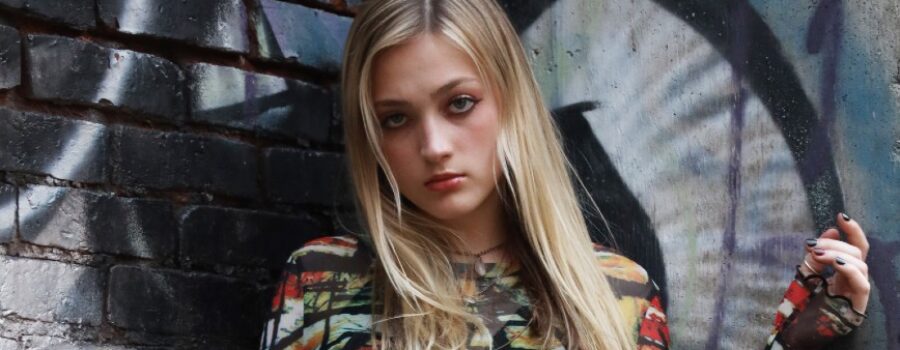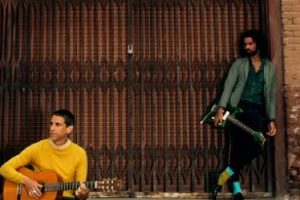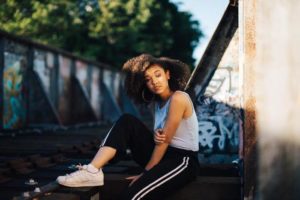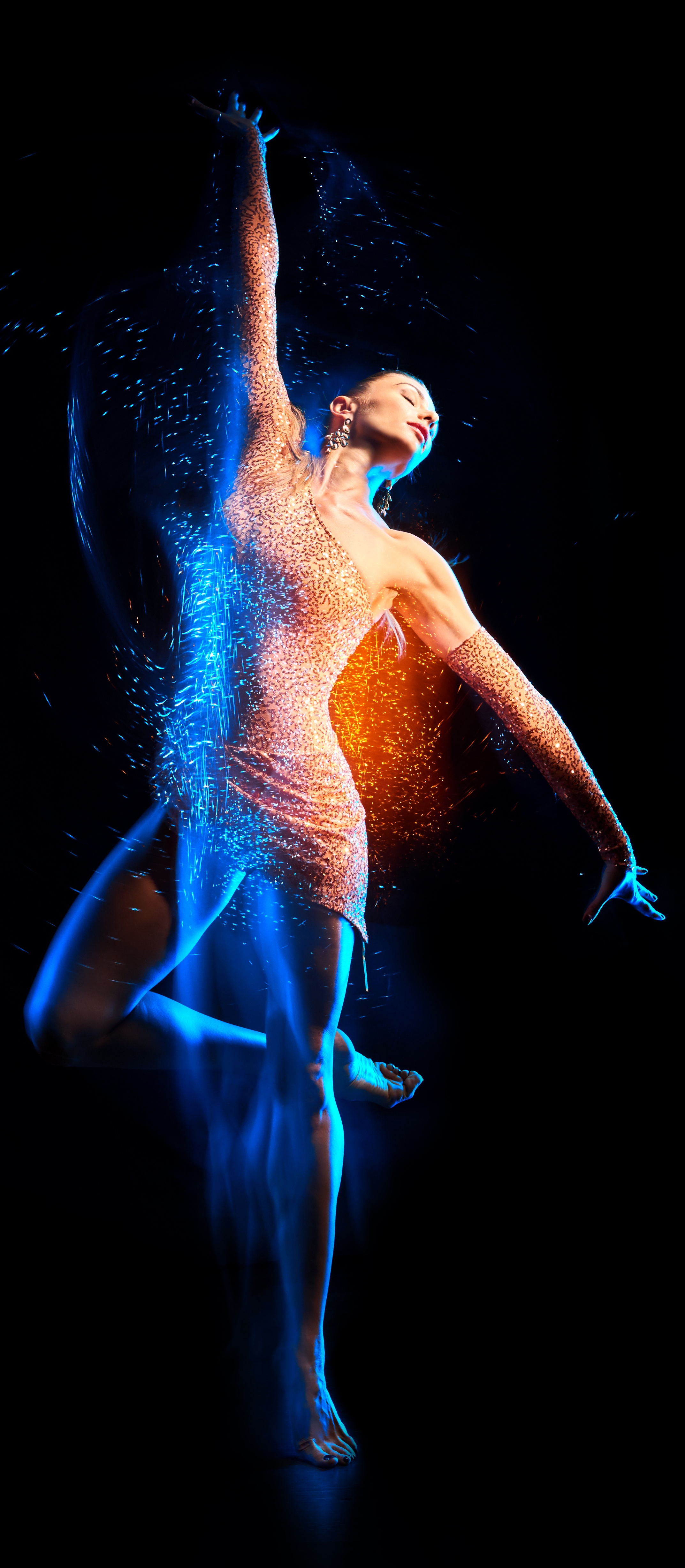Like many her age, Mia Morris took advantage of platforms like YouTube to make a path for herself. We talked about the highs and lows of being brought up online have given her, what her generation’s creative legacy will be, “Fucket Bucket,” and more in this back and forth with a young dynamo set to take the world by storm.
Kendra: I get excited whenever a drummer is on the other end of an interview because whenever I go to a show I find myself zoning out on the drummer. After all, it’s just a wild thing to see. Anyways, my love and excitement aside – what initially drew you to the drums? Did you play in the school band, are you self-taught?
Mia Morris: I’m right there with you. My parents encouraged me and my brother to learn piano just for fun, but I chose drums because I thought they were loud and looked really cool. It didn’t take long for me to develop a love for rhythm, for the beat of every song. I was astonished by both the pressure of the role of a drummer, and the physical challenge that came with it. I guess it was also a fun challenge trying to learn one of the harder and time-consuming instruments, not to mention the assembly and disassembly process it takes to even have a full set to play.
I’ve had a number of incredible drum teachers that not only taught me how to play but inspired me with every lesson. I haven’t taken a drum lesson in years, but I always love hearing advice from any drummer who’s willing to share because there are endless ways to play and lessons to learn when it comes to drums. There’s always room for improvement, so it’s very easy to appreciate any drummer I come across.
Kendra: I’m in the age that bridged the gap between a pre and post-internet world, but for you – its’ always been there and I feel like your generation has been able to utilize it in such grandiose ways. Of course, though, there are drawbacks as well with an online world. So with that, what are some of the advantages and disadvantages of growing up and being a musician in the age of social media?
Mia Morris: A huge advantage of social media and the internet, in general, are the resources and connections available with the touch of a finger. I never realized how big the world was until I noticed how many people were on social media platforms (especially YouTube, where I started). It would have been so much harder to reach the number of people I’ve started to connect with without the use of social media.
Social media has also taught me how much hate is channeled in the world, which could be seen as both an advantage and disadvantage. It’s sad seeing people talk shit behind screens because they can and because it makes them feel better about themselves. It’s sad how hurtful negative comments are on the receiving end and how they can taint love and passion for the creator. However, I’ve also learned that no matter what, people are gonna talk shit. I can appreciate the haters for being consistent in that everyone has them. If people aren’t hating what you’re doing, will anyone absolutely love it? I think if your work doesn’t have passionate reactions, then you’re probably doing something mediocre.
Kendra: This month we have you, this young dynamo, and also a 19-year-old hip hop artist who taught herself how to mix and master. It makes me genuinely excited to see what the next wave of artists has in store. Looking ahead, what do you think Gen Z’s musical and artistic legacy will ultimately be? Or rather, what do you want it to be?
Mia Morris: What I hope and think Gen Z’s musical and artistic legacy will be is a major shift for the music creators and music consumers. My generation doesn’t have to listen to programmed music. We find music and artists we love, and it’s not because we heard them on the only radio station in town. A direct connection between the people that make music and the people that like it leads to much greater variety, creativity, and hopefully a way for creative people to be fairly compensated for the art they make.
Kendra: Looking at dates and doing some math…you were like in middle school when you started dropping singles back in 2017. Since the days of “Reach It” and “You Should Know,” how do you think your creativity has grown?
Mia Morris: I feel that, if anything, I’ve found how much I truly appreciate the freedom, joy, and release that creativity grants. It’s something in life that is never the same but is the root of so many incredible ideas. Creativity flows through your body allowing you to disconnect from your mind, so you don’t have to think, just feel. Creativity pushes through what lies beneath all of the noise and internal battles inside. It’s therapy, it’s conflict, it’s love, it’s anything you want it to be. Nothing that I’ve experienced is quite like creativity.
Kendra: You’ve noted artists like No Doubt and Avril Lavigne were some of the ones you looked up to, but did you ever dive into what’s considered classic emo? Because you got this 2000’s Warped Tour vibe going on.
Mia Morris: It’s funny you mention the Warped Tour because when I was 12, I got to get up on stage and play with The Ataris on the Warped Tour in Indianapolis, which was a turning point for my interest in a music career.
There’s so much cross-influence between the emo, shoegaze, ska, and grunge scenes from around that time, that I’m sure I’m influenced by bands I don’t even know the names of; but I do know I’m influenced by Weezer and My Chemical Romance.
Kendra: Well, you definitely have that vibe, especially in your latest, “Fucket Bucket.” Such a great song, such a great…life lesson of sorts to take from it. I do want to know though, what led you to the realization in your own life that you needed a fucket bucket to toss the unimportant things like the stress into?
Mia Morris: Thank you! The root of this concept goes along with what I was saying earlier with hateful people. I think love and hate can become habits like anything else, so I choose love. “Fucket Bucket” was a message as much to me as anyone else because I know how shitty it feels to not channel feelings of love and fun. When I’d get glimpses of love and fun throughout times of stress, I’d notice how much better it feels than the ladder. Putting effort into things that make you feel good feels amazing throughout the entire process, and I don’t want anyone feeling anything less than that. It sucks holding onto the past or onto things that aren’t benefiting your overall wellbeing. Life is short, it’s silly to trip on what you can’t change instead of focusing on showing up for yourself every day.
Kendra: Time for a side note moment – since it’s February, I’m asking everyone to please share what they believe is the best love song and a bit of insight as to why they believe that song is it…
Mia Morris: “Yesterday” by The Beatles is my favorite love song because it revolves around the side of love that isn’t all sunshine and rainbows. It describes the side of love that is just as important and persistent as the other that isn’t necessarily talked through as much as it should be. It shows the high highs and the low lows that come with love. Also, the feelings you get throughout listening to Yesterday accurately describe the pushes and pulls of love in a way that words just can’t. It is my absolute favorite song.
Kendra: Lastly, with “Fucket Bucket” out now, what else can fans both new and old be on the lookout from you in the coming months?
Mia Morris: I release a lot of music since I make all of it in my basement, so I don’t anticipate there being a shortage of material anytime soon. As long as live shows continue to open up, I’ll hopefully be playing more live opening shows in 2022 than I ever have.






